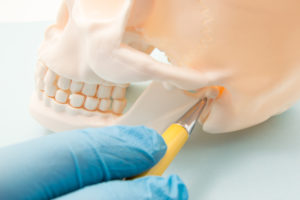
Temporomandibular joint dysfunction (TMJ) affects dental patients rather frequently. While it is unclear what exactly causes TMJ the disorder can be extremely painful. To help understand TMJ better it would be good to understand the causes, symptoms, and treatments of the disorder.
Causes of TMJ
Although doctors are not entirely sure what causes Temporomandibular joint dysfunction (TMJ) there are specific factors that can determine whether or not someone has the (TMJ) disorder.
Review the cause of TMJ below to help you better determine if you’ve developed the disorder.
- If you have experienced an Injury to the jaw this would include whiplash
- Teeth grinding and clenching because it’s often a symptom of the disorder
- Movement of the disc or soft cushion between the joints ball and socket
- Stress causes tightening of the jaw and facial muscles, or teeth clenching
- Rheumatoid arthritis or sleep apnea can both lead to development of (TMJ)
Symptoms of TMJ
More often than not a patient is unaware that they have Temporomandibular joint dysfunction (TMJ) until they begin to experience symptoms. These symptoms can be difficult to link to (TMJ) which is why it is important for a patient to familiarize themselves with all the (TMJ) symptoms.
- Popping and locking of the jaw
- The inability to open the mouth wide
- Problems chewing and biting comfortably
- Pain and tenderness in the jaw or face when chewing or speaking
- A grating sensation near the ball and socket of the jaw
- Facial swelling
Treatments for TMJ
As far as treatments for Temporomandibular joint dysfunction (TMJ) is concerned, it’s important to schedule regular appointments with your dentist. This is because they will provide you with a customized treatment plan. This treatment could include a night guard to wear on a nightly. This can help relieve your mouth of inflammation and allow all your jaw muscles to completely heal.
Schedule A Consultation
Temporomandibular joint dysfunction (TMJ) is difficult to self-diagnose. Which is why it’s very important to schedule a consultation with your dentist. Doing so allows you to get a thorough examination, and also helps determine whether or not you are suffering from (TMJ) disorder.

